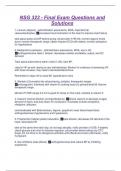NSG 323 - Final Exam Questions and
Solutions
1. Lanoxin (digoxin) - administration precautions, MOA, important lab
values/electrolytes. ✅increases force/contraction of the heart to improve heart failure
take apical pulse and BP before giving, tell provider if HR<60, monitor digoxin levels
due to narrow therapeutic range, obtain frequent ECG with elderly, monitor potassium
for hypokalemia
2. Metoprolol (Lopressor) - administration precautions, MOA, use in HF.
✅Antihypertensive, Beta 1 blocker, decreases cardiac excitability, output, and O2
demand.
Take apical pulse before admin (hold if <50), take BP.
Used in HF as well, dosing is very individualized. Monitor for evidence of worsening HF
with dose increase, may need to decrease/discontinue
Remember to taper off to avoid MI, hypertensive crisis
3. Warfarin (Coumadin) lab values/tracing, antidote, therapeutic ranges.
✅anticoagulant, Interferes with vitamin K (clotting factor) to prevent/treat MI. Narrow
therapeutic range
Monitor PT/INR (range 2.0-3.0 is good for those on this med), antidote is vitamin K
4. Calcium channel blocker (contraindications). ✅blocks calcium to decrease oxygen
demand of heart, and slow down AV conduction. Examples include amlopidine,
nifedipine, diltiazem.
contraindicated with Beta blockers, digoxin, grapefruit, heart failure/heart block,
antihypertensives (hypotension) and hypotension
5. Propranolol (Inderal) patient education. ✅beta blocker, decreases O2 demand of the
heart, decreases HR
take at the same time each day, do not stop abruptly, notify provider of SOB, if diabetic
check glucose and urine for ketones regularly, call provider before taking any OTC
drugs. Do not drive or do dangerous activities until effects are known (dizziness), notify
if pregnant
6. Ace inhibitors (side effects). ✅antihypertensives that reduce BP by inhibiting
angiotensin
, Lisinopril causes dizziness, fatigue, headaches, non productive cough, hypotension,
angina, abdominal pain (N/V/D), ED, impaired renal, hyperkalemia, rashes.
Captopril can cause first dose hypotension, cough, hyperkalemia, renal failure,
angioedema
1. Nitroglycerin (side effects and drug interactions). ✅anti-anginal, prevents acute
anginal attacks.
Watch for dizziness, headache, hypotension, blurred vision, orthostatic hypotension,
reflex tachycardia
interacts with antihypertensives, aspirin, heparin, ED drugs (sildenafil), and alcohol due
to increased hypotension
How to use nitroglycerin ✅1. place patient in sitting position
2. place SL tablet under tongue
3. wait 5 minutes, repeat 3 times max (5 min between doses)
4. if angina does not resolve, call 911
2. Loop diuretics (administration precautions). ✅antihypertensive, potassium wasting
diuretic, used in HF and renal disease as well.
obtain weight before/during therapy, give in the morning, Hold if dehydration occurs,
monitor BP, monitor edema and ascites. Give in 1-2 mins SLOW over IV, monitor for
hypokalemia
1. Streptokinase: patient monitoring/assessment. ✅Thrombolytic, used for acute MI,
massive PE, acute ischemic stroke within 3 hr onset, and to restore function of occluded
central venous accesses
Monitor continuous ECG for arrhythmias, monitor for hypersensitivity reaction
(angioedema), monitor for bleeding (INR, APTT, platelets), especially with patients on
anticoagulants. Stop or avoid before surgery
Treatment must begin within 3 hours after onset of stroke symptoms and only after
diagnostic imaging has been done to rule out hemorrhagic stroke
3. Thiazide diuretic (complications/ side effects). ✅hydrochlorothiazide, potassium
wasting diuretic, antihypertensive
watch for hypotension, hypokalemia, dizziness, hyperglycemia, hypomagnesia,
hyponatremia, headache, GI effects.
Complications - acute myopia, acute angle closure glaucoma (vision changes, muscle
pain), muscle spasms/weakness (hypokalemia), anaphylaxis




